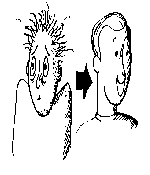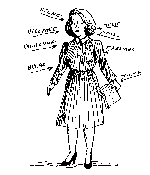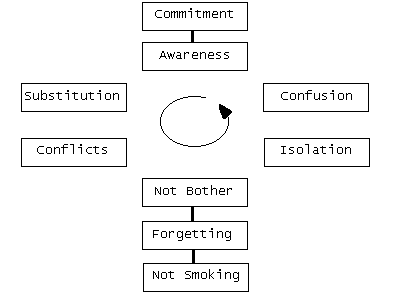Okay, Don't Quit

Chapter 1
How It Works
Most smokers have pressure on them to stop smoking. It may be health concerns, or family pressure, or work restrictions. Smokers have reasons to stop smoking, but they find it is very difficult to quit cold turkey.
The problem stems from the way smokers try to quit — in one big step. Trying to stop all at once activates hundreds of habit and psychological connections. These hooks tie your smoking habit to having breakfast, to going to work, to taking a break, and to talking to your friends. By attempting to stop in one step you're trying to overcome hundreds of connections at once.
The program described here will help you separate and weaken your smoking connections while your need for nicotine is decreasing gradually. To this end, your smoking routines will be confused, tricked, and overloaded. You will learn to chip away at your smoking habit, small step after small step, until the habit's strength is broken. By concentrating on undermining the habit structure while permitting a certain amount of nicotine cigarettes, you get yourself off the hook — you don't have to quit cold turkey.
In addition, flexibility built into the program allows for days when your resolve slips. You'll learn how to make the adjustments needed to stick with the program through your mother-in-law's visit, your daughter's first date, or your first IRS audit.
In fact, you can smoke whenever you need to throughout the program. The only requirement is that you alter the way you smoke (much more on this later). A variety of minor changes are designed to slowly erode the strength of your habit.
You may be thinking it sounds easy. Well...it's not exactly easy. The program does require effort. You'll be asked to make lists and change the ways you smoke — but at no point are the steps extremely difficult.
Throw in a sense of humor and you might even enjoy the program.
The program disrupts and weakens your smoking habit to the point where you won't bother to smoke. As you work through the exercises, smoking will lose its uncontrollable pull and become a rather annoying act. Eventually, you stop smoking just as you would stop doing anything that was bothersome.
 You experience no withdrawal because you can have
the cigarettes you need.
You experience no withdrawal because you can have
the cigarettes you need.
The confusion and disruption approach to breaking a habit lets you continue to smoke throughout the program, which means no withdrawal and no radical changes in your life. You'll be less inclined to snap at your co-workers and kick the dog. Since you can have the cigarettes you absolutely need, you avoid the strain of quitting cold turkey.
The program uses a combination of psychological systems: classical conditioning, behavior modification, and suggestion reprogramming. The various strengths of each approach are applied to the part of your habit where they can have the greatest impact.
The burden of eliminating your smoking habit shifts from the strength of your will power to the psychological system ability to alter behavior. No longer is stopping smoking a matter of will power, it's a matter of persistence. All you need to do is stay with the exercises until the habit counter-measures have time to unravel your smoking habit.
The tenacity of the smoking habit stems from its multiple grip on you: it combines input from each of your five senses, your contact with others, and your nicotine addiction. Taken individually, no single element is very strong, but taken together, they push and pull from so many sides that they make smoking a very difficult habit to shake.
 The habit connections come at you from every
angle.
The habit connections come at you from every
angle.
The DON'T QUIT program doesn't use a frontal attack. You'll never be asked to just stop smoking, because direct attack mobilizes your habit's resistances. Rather than trying to stop your smoking habit in one step, the program systematically adds elements to your habit until it doesn't recognize itself. "I can't quit," dissolves into, "It just isn't the same anymore." No fight, no fuss, just deadening disinterest.
The program goes something like this: you become more aware of how you're smoking and learn to distinguish between the different types of cigarettes, namely habit and addiction. Next, you learn how to confuse your habit type cigarettes and how to isolate your addiction cigarettes from other reinforcers. As your habit weakens, you work in substitutes and learn how to forget to smoke. Eventually smoking becomes too much of a bother.
Persistence is the only requirement for the program to work. If you stay with the program, even if your progress is slow, you will become a non-smoker.
Dismantling a habit that took years to develop, however, takes time. Fortunately, you won't have to wait that long. With serious effort, you will start noticing the changes in about three weeks.
Moreover, you can keep smoking. There's no requirement that you stop cold turkey at any given time. There is no set time limit. The program can take from three weeks to six months. If it takes a year or two, that's fine also.
Here's an overview of the stop smoking program.

For many, once they understand how the program works, they experience a tremendous sense of relief. They realize they can quit — and the pressure is off.
Examples:
Although reduced stress isn't essential to the program's success, it is a nice side effect.